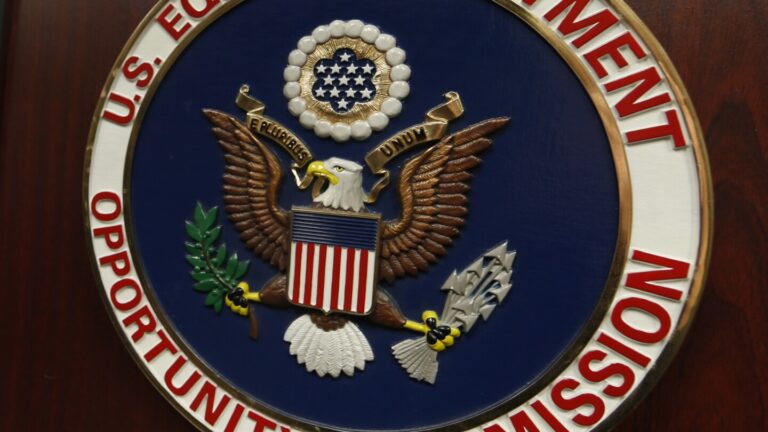NEW YORK (AP) — A federal judge on Monday granted the U.S. Conference of Catholic Bishops and employers in two Southern states a temporary exemption from complying with federal rules that require workers to provide time off for abortions and other workplace accommodations.
Judge David Joseph granted preliminary injunctions in two consolidated lawsuits, one brought by the attorneys general of Louisiana and Mississippi and one brought by the U.S. Conference of Catholic Bishops, a Catholic university and two Catholic dioceses.
Lawsuit challenges the rules The Equal Employment Opportunity Commission issued thesaid abortions are among the pregnancy-related conditions covered by the Pregnancy Workers Fairness Act, which was passed in December 2022 and took effect last year.
The EEOC rule goes into effect Tuesday.
Joseph, who was appointed to the bench by former President Donald Trump, barred the EEOC from enforcing the abortion provisions of its rules against Catholic plaintiffs and employers in Louisiana and Mississippi for the duration of the litigation.
His sentence came just days after a federal judge in Arkansas ruled on the case. A similar lawsuit was dismissed The lawsuit was filed by 17 states, led by Arkansas and Tennessee. Judge D.P. Marshall Jr. of the U.S. District Court for the Eastern District of Arkansas, who was appointed by former President Barack Obama, ruled that the states lacked standing to sue.
“The district court applied a common-sense interpretation of the clear language of the Pregnant Worker Fairness Act,” Louisiana Attorney General Liz Murrill said in an emailed statement.
The Louisiana ruling was a partial victory for the attorneys general of Louisiana and Mississippi, who had sought a broader emergency injunction to block full nationwide enforcement of the EEOC rule, a request that alarmed some civil rights and women’s advocates, who had warned that the EEOC rule was crucial to successful enforcement of the law.
In an amicus brief, the American Civil Liberties Union and the National Women’s Law Center, along with more than 20 labor and women’s advocacy groups, cited dozens of cases where employers continue to resist providing accommodations to pregnant workers and said EEOC rules provide clear guidance on resolving disputes.
“The court has left some pregnant workers who need abortion-related accommodations to fend for themselves,” said Gaylynn Burrows, NWLC’s vice president of workplace justice and education.
Rachel Shanklin, national women entrepreneur director for Small Business Majority, said even Monday’s limited ruling will have a significant impact because it will “make it harder, at least temporarily, for women in the workplace to access abortion care.”
“Our research consistently finds that women entrepreneurs say being able to choose if and when to start a family plays an important role in advancing their careers and starting their small businesses,” Shanklin said in a statement.
Dina Bakst, co-founder and president of A Better Balance, a legal advocacy group that has led the push for the law for a decade, denounced the Louisiana ruling, saying it “ignores decades of legal precedent” that interprets pregnancy-related medical conditions to include abortion.
But she stressed that given the injunction’s limited scope, “it is important for pregnant and postpartum workers to understand that this decision does not mean that their rights under the PWFA have been taken away.”
The Pregnancy Worker Fairness Act passed with broad bipartisan support in December 2022 after a decade of campaigning by women’s rights advocates and was hailed as a victory for low-wage workers. People who are routinely denied accommodations ranging from time off for medical appointments to the ability to sit or stand while at work.
But many Republicans, including the bill’s co-sponsor, Sen. Bill Cassidy of Louisiana, were infuriated when the EEOC said the law would apply to abortion. The two Republican commissioners on the five-member EEOC voted against the rule.
The EEOC said including abortion in its rules is consistent with its own decades-old interpretation of pregnancy-related anti-discrimination laws and the numerous court decisions that have upheld that interpretation.
The EEOC said it would consider on a “case-by-case basis” circumstances in which a request for accommodation might violate state law, and that the EEOC also said it would consider providing accommodation to employees if they were required to take time off work to undergo surgery or recover from complications.
“The EEOC has effectively forced states like Louisiana and Mississippi to facilitate abortion in violation of state law,” the attorneys general said in their lawsuit.
Mississippi Ban most abortions after 15 weeks of pregnancy. In Louisiana Near-total ban on abortionThe only exceptions are when continuing the pregnancy poses a significant risk of death or disability to the patient and when the fetus has a fatal abnormality.
The U.S. Conference of Catholic Bishops said in its lawsuit that it publicly supported the Pregnancy Worker Fairness Act because lawmakers emphasized the law’s noncontroversial nature, with some lawmakers clarifying that no leave is required for elective abortions.
“The EEOC has hijacked bipartisan protections for pregnant women and their babies to impose a nationwide abortion accommodation mandate,” said Laura Wolk Slavis, an attorney representing the Catholic groups. She called the ruling an “important step” toward “restoring the law to its original purpose.”
_____
Associated Press women’s workforce and state government coverage receives financial support from Pivotal Ventures. All content is the sole responsibility of The Associated Press. standard To work with a charity, see our list of supporters and funding areas. AP.org.

